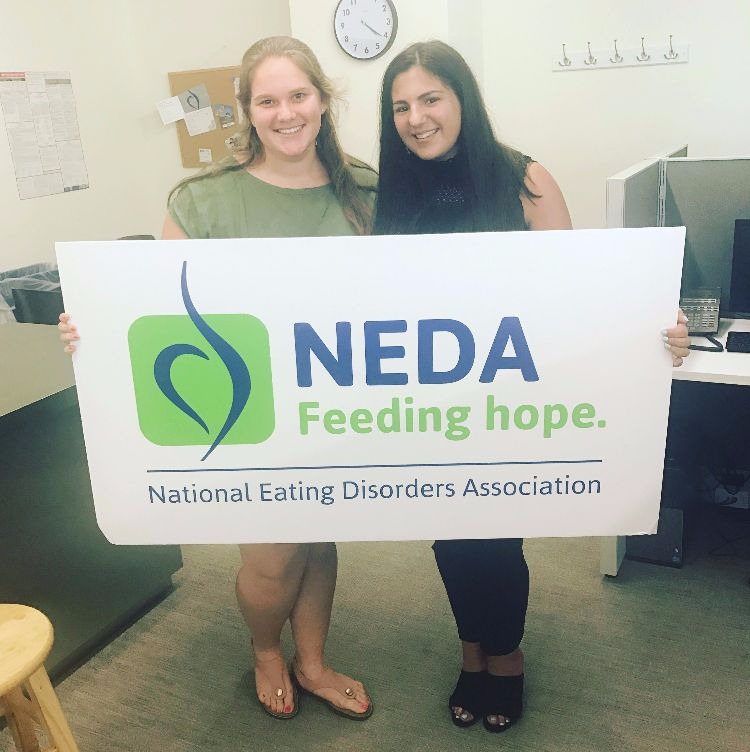How I Became a Body Image Activist Through ‘The Body Project’
Body positivity is an important part of who I am, since I’ve struggled with body image for most of my life. I came to learn about the body positive movement within the last couple of years, and now, instead of picking apart what I see in the mirror, I am thankful for my body because of all the things it can do.
As I became increasingly aware of the body positive movement, I noticed how body bashing was the norm amongst my peers. I would constantly hear people mutter negative self-talk while eating lunch, walking down the hallways, or staring at the “skinny mirror” in the girls’ locker room. I was done listening to people judge each other based on body size and food intake. Most of all, I was sick of people feeling like they are not good enough just the way they are, myself included.
In my junior year of high school, my friend and I were inspired to do something to put a stop to this negativity, so we applied for a local grant requesting to make our school a more body-positive environment. It was important for me to find a program that would make a tangible difference and lasting impact, so I reached out to NEDA and learned about The Body Project: an evidence-based body confidence program for girls.
The program, which has over two decades of research behind it, emphasizes the healthy-ideal over the appearance-ideal. The Body Project is a group-based intervention that provides a safe space for a small group of girls to discuss the societal appearance-ideal, where this ideal came from, the costs of trying to pursue this ideal, and ways to combat body-related pressures. Even though the Body Project is exclusively for girls, my classmates and I were able to spread these messages throughout the community, reaching all ages and genders, through various activism activities. Students who went through the program led workshops, put Post-It notes with body-positive phrases on bathroom mirrors and exercise machines, and encouraged informed conversations about body image.
My motto throughout the process of implementation was “we have to start somewhere.” I recognized that this program wasn’t going to fix the problem of preexisting eating disorders, and I was hopeful that it would help prevent my body dissatisfied classmates from the developing full-blown eating disorders.

Initially, when my friend and I decided to bring the Body Project to our school, we worried, “What if no teachers want to facilitate the program?” “What if students don’t sign up?” We were pleasantly surprised to find out 12 teachers, the maximum number recommended for a facilitator training, eagerly signed up for an 8-hour training on a Saturday after just one informational email. I had teachers coming up to me after the training telling me that this was the best professional experience they had ever had.
Likewise, there was an overwhelming interest from students who wanted to participate in this important program. We had to cap sections of the program and create a waiting list for the following semester. My classmates would tell me stories about how close they got with the people in their groups and how meaningful this program was to them. It was unbelievable to see that on the participant evaluation, nearly 100% of participants said that they would recommend this program to a friend.
It was rewarding to see all of my small victories, from receiving a grant to encouraging students to sign up, pay off. About a year after applying for the grant and working with my school’s administration and NEDA to get this program off the ground, I am proud to say that there are 86 new body-positive activists at Horace Mann School—and I am confident that this number will only continue to grow in the years to come.
When I was advocating for this program, I had no idea how eye-opening this experience would be, not only for myself, but for my classmates too. Sitting in a room with my female peers, discussing anything from what made a person beautiful to what we would tell our younger selves changed how I speak about and treat my body. The Body Project made a greater impact than I could have ever imagined.
This summer, after seeing the incredible results of the Body Project at my high school, I decided to volunteer at NEDA to help spread awareness about this important program. To anyone who is also sick of all the negative body talk that occurs in your school, home, or organization, I encourage you to get involved! Whether it is bringing a Body Project training to your school, going through the program as a participant, or spreading messages of body positivity in your community, there are many different ways to inspire change.
When I first wanted to get involved with body-positivity, I watched countless TED talks about self-love, media, fashion, eating disorders, and more. I’d read article after article on the NEDA and Proud2Bme blog, and other platforms with similar messaging. Throughout this journey, I have come to realize, the more educated you are, the more vocabulary and ability you’ll have to promote a positive mindset in those around you. You might not be able to reach everyone you want to right away, but remember that change happens one person at a time.




